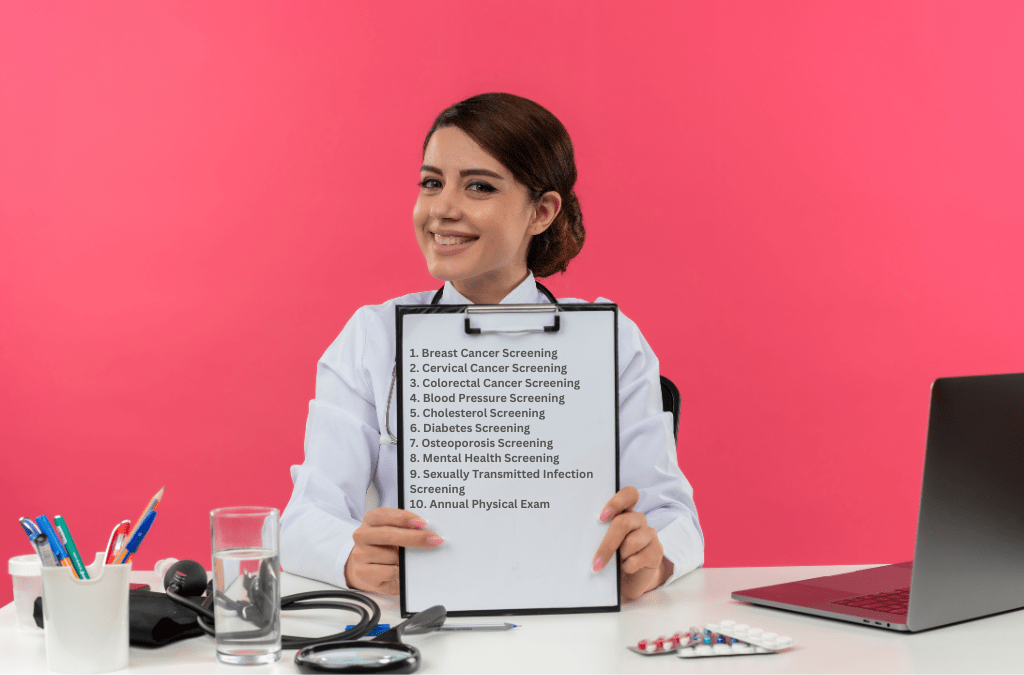
Table of Contents
Introduction
Women are more prone to developing some health issues than men. Therefore, regular screenings are important to get the appropriate treatment on time.
In this post, we’ll outline the suggested health screenings every woman should get
at different ages, which can aid in the early detection of probable medical disorders and prompt treatment.
10 Essential Health Screenings Every Woman Should Get
1. Breast Cancer Screening
Breast cancer screening is the assessment of women’s breasts to detect cancer, even before they show any signs and symptoms, to be safe. It can be done in the comfort of your home by self-examining or getting your breast examination during regular visits to your gyne.
There are more serious forms of breast cancer screenings, such as:
- Mammograms
- Breast magnetic resonance imaging (MRI)
Mammograms play a significant role in detecting breast cancer in women as early as possible. It is recommended to get your first test done at the age of 40 and yearly after that. However, your healthcare provider may suggest getting them from the age of 25 if you have a strong family history of breast cancer.
Breast Magnetic Resonance Imaging consists of magnetic radio waves used only for women at a high risk of breast cancer and is recommended alongside mammograms to get a clear diagnosis.
We advise seeking medical advice on how to do self-examinations because the suggested frequency can change depending on various other factors.
2. Cervical Cancer Screening
The American Cancer Society’s estimates for cervical cancer in the United States for 2023 indicate that approximately 13,960 new cases of invasive cervical cancer will be diagnosed, and sadly, about 4,310 women are expected to lose their lives to this disease.
Therefore, its screening is very important and is done by conducting a pap smear test. During this test, a speculum is inserted inside the vagina to gently get the cervix cells onto the speculum, which is later sent to the lab for inspection of any cancerous cells present.
It is one of the most important health screenings for women. By getting this test done regularly, cervical cancer is highly preventable. Your first screening is done at the age of 21. After that, they can be done every three years.
3. Colorectal Cancer Screening
Colorectal cancer starts when a polyp growth is noticed in the colon or rectum. It is the third main cause of death in women due to cancer; therefore, it should have a significant place on the women’s health check-up list.
The symptoms of colorectal cancer sometimes don’t show until the cancer is in an advanced stage, so women at average risk need regular screening from age 45 to 75.
The tests needed for colorectal cancer are either a visual examination of the colon and rectum or stool-based tests that are mentioned below:
- Colonoscopy
- Fecal occult blood test and fecal immunochemical test
- Sigmoidoscopy
- Computer tomography
- Stool DNA test
- Double-contrast barium enema
Generally, if you don’t have any symptoms, then you will get a regular stool or blood test done from the recommended age. However, if you have any symptoms, your healthcare provider will advise which test you should get according to them. A healthcare professional will choose the screening technique based on each patient’s risk and symptoms.
4. Blood Pressure Screening
Blood pressure screening is one of the most significant health screenings for women. Having untreated blood pressure can cause many health risks like hypertension, heart disease, dementia, vision problems, etc.
It is measured by using blood pressure monitoring equipment which includes a stethoscope and a sphygmomanometer. Blood pressure screening should be done every two years between the ages of 20 to 40 and checked yearly after that.
A blood pressure reading of 140/90 or above means high blood pressure; Hence, treatment is necessary.
5. Cholesterol Screening
Cholesterol screening is one of those blood tests every woman should have regularly checked, especially if you have a family history, as uncontrolled cholesterol levels cause many health problems that include cardiovascular disease, dementia, and strokes.
A routine cholesterol screening is done by getting a blood sample from a vein in your arm. It should be done regularly by those at risk between 20 and 45.
To improve cholesterol levels, you must change your diet, like avoiding excessive oil or fats.
6. Diabetes Screening
Diabetes is a chronic health condition that demands a lot of care and precaution. It has many complications if proper treatment is not given. If you have risk factors for diabetes, then the screening will start at an earlier age. Otherwise, regular screenings should begin at the age of 35.
The following tests are used for diabetes screening:
- Fasting blood sugar test
- A1C test
- Glucose monitor test
These tests are done by drawing a blood sample from a vein in your arm after an overnight fast; if your test results are below 100 mg/dl then you are considered normal. If the levels are in between 100 to 125 mg/dL then you are considered pre-diabetic, and 126 mg/dL or higher indicates you have diabetes.
It is also one of those blood tests every woman should have at the recommended age.
7. Osteoporosis Screening
A medical condition in which your bones’ structure and tissues become so weak that they get brittle and can easily get fractured is called osteoporosis; It doesn’t show any symptoms until you have a fracture.
However, regular screenings can lower the odds of that happening.
It is an effective screening that takes an important place in the annual physical exam checklist for females over 50.
Not having a family history of this disease means your yearly screening should start at age 65. But if you do have a family history, then the screening should start from the age of 45.
It is done using a DXA machine which is just like an X-ray machine. It shows the bone density of bones at high risk of fracture, like the spine and hips.
8. Mental Health Screening
Regular mental health screenings for women are as important as any other tests done for physical conditions. Our mental health revolves around our psychology, emotions, and social well-being.
According to the U.S. Department of Health and human services, it is said that 1-2 women in the U.S. developed a mental health illness out of every five women in the last year.
Depression and anxiety are the most common mental health illnesses in women; therefore, Mental screenings should be done every 3 to 5 years and can be conducted by having the following:
- Question and answer sessions
- Lab tests
- Physical examination
Mental health screening should be an essential part of women’s health check-up list. You should consult your physician if you are worried about your current state of mind, who will guide you on getting further treatment.
Discussing this with your doctor is advised because the frequency of mental health screenings might vary significantly depending on individual circumstances and risk factors.
Tip: You should consult a doctor who makes you feel comfortable and whom you can trust to answer your questions.
9. Sexually Transmitted Infection Screening
People who are sexually active are more likely to develop sexually transmitted diseases, especially between the ages of 15 and 24. It makes you more prone to developing sexually transmitted infections like:
- Chlamydia
- HPV
- Hepatitis A & B
- Gonorrhea
- Syphilis
- Trichomoniasis
- LGV
Regular pelvic examinations and blood tests can detect infections. If left untreated, they can cause many medical conditions, one of which is affecting fertility.
Therefore, sexually active females should get this screening done annually. Having new sex partners means you must get it done more frequently.
10. Annual Physical Exam
An overall physical check-up is very important for your overall health. Adolescents and young females should get it done every two years. After the age of 40, this test will be done frequently every year.
During this exam, your healthcare provider will check your:
- Vital signs
- Blood pressure
- Weight and height
- Mouth and ears
- Check pulse
- Examine skin
- Do breast exam
- Pelvic exam
- Suggest blood tests for blood sugar and cholesterol levels
If a health issue is diagnosed on time, that is better than getting diagnosed later with worse health conditions.
Actionable Quick Tips
Tip 1: Talk to your doctor about the recommended health screenings for your age and gender.
Tip 2: Try to understand the risks and benefits of each screening before you get it done.
Tip 3: Get your screenings regularly, even if you feel healthy.
Conclusion
You are now prepared to take proactive measures to maintain your health thanks to this thorough guide to important health exams for women. These suggested tests are essential for the early identification and successful treatment of common health problems that affect women.
The above list gives you the most recommended health screenings by age and gender; therefore, it is your guide to ensuring you get the necessary screenings done at the right time.
FAQs
Ans. Other important health screenings for women are lipid profile, skin examination, eye examination, sigmoidoscopy, etc.
Ans. Each health screening has its age requirement and frequency that your healthcare provider may provide information about. For example, screening for STIs is done from the age of 15 and should be done every year, whereas, for cervical cancer, the screening should start from the age of 21 and be done every three years.
Ans. Sometimes tests can give false positive results, leading to unnecessary treatment. So you should recheck if you have any doubts.
Ans. You can search online for local laboratories that offer lab tests and also consult your local physician for guidance.
Ans. While some health screenings are done instantly, however, some are not. Therefore you need to have patience for tests like ultrasounds where you need to have a full bladder. Or tests that require fasting for a set number of hours.







